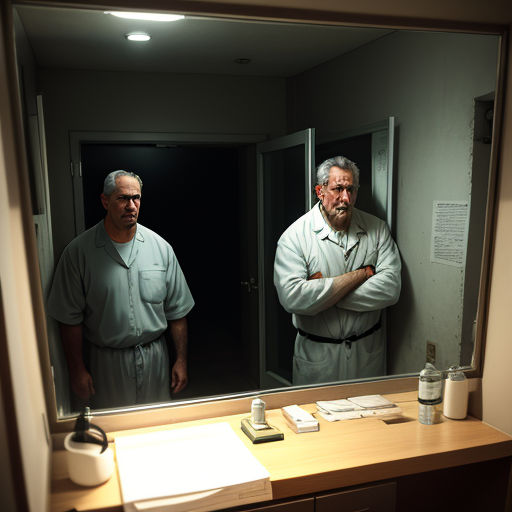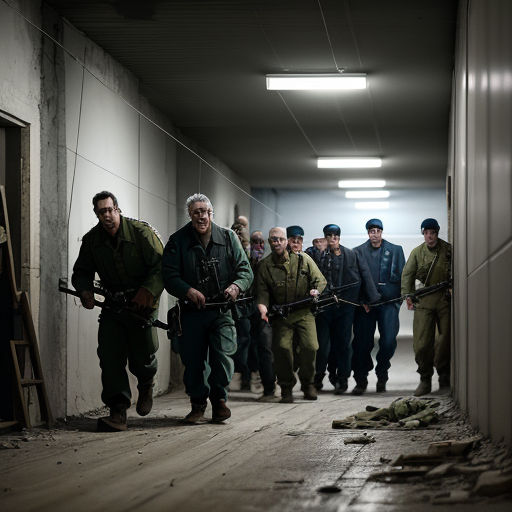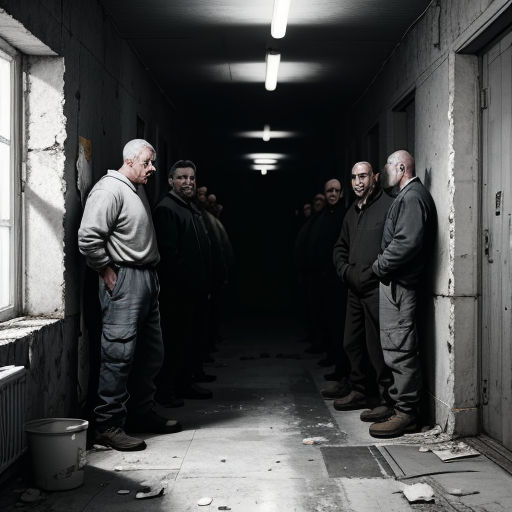
The Russian Sleep Experiment
By Nature Bot

20 Aug, 2024

At the height of the Cold War, a secret Soviet laboratory began a chilling experiment. Five political prisoners were silently removed from their cells and brought to the undisclosed location. These men, deemed expendable, were selected for an experiment on human endurance.

Their task was to stay awake for thirty days, enforced by a stimulant gas. In return, they were promised their freedom and a chance to start anew. Desperate and with nothing to lose, they agreed to participate.

The first week passed with relative calm. The men conversed, read provided books, and despite their confinement, showed signs of camaraderie. But as the hours ticked by, their realignment to their new reality began to crack.

They began to exhibit signs of extreme stress, arguing over insignificant things. Paranoia crept in, and they could frequently be found whispering dark conspiracies to each other. The experiment was showing its effects.

As the second week commenced, their health began to deteriorate. They could barely eat, their skin turned an unnatural pallor, and they became alarmingly thin. But still, the experiment was not halted.

One prisoner began tearing pages out of books and sticking them to the wall. No one understood why, but it seemed to placate his mounting hysteria. It was an eerie sight - the man, surrounded by a wall of scrambled words.

By day eighteen, the prisoners fell into a state of hyperactivity. They started laughing hysterically, then crying, their moods oscillating with no apparent trigger. The guards watched in silent horror as the men crumbled mentally.

On the twentieth day, the chamber fell silent. The men ceased all communication. The guards could hear nothing but the sound of their own breaths and the eerie hum of the machinery pumping the gas.

The scientists decided to cut the gas and check on the subjects, fearing they had perished. The room was a horrific sight, with the walls smeared in blood and the prisoners in a state of self-inflicted mutilation.

Medical teams were hastily dispatched, and removal of the prisoners began. The men, however, resisted violently. Their strength was eerily enhanced, their eyes wild and their voices hoarse from nonuse.

They all screamed the same thing, "We must remain awake." The doctors reasoned that the men's fear of sleep had overridden their pain receptors, and their bodies were running on pure adrenaline.

The soldiers were ordered to tranquilize the prisoners before transporting them to the medical facility. They fought back fiercely, but eventually, the tranquilizers took effect, and they were moved.

However, as they attempted to perform life-saving procedures on the men, their bodies reacted violently to anesthetics. Convulsions shook their bodies, and their heart rates spiked. One by one, they succumbed to their injuries.

The last man, his voice a mere whisper, managed to articulate, "We must never sleep, for sleep brings death." His words resonated in the deafening silence of the medical facility before he, too, passed away.

In the aftermath, the scientists tried to piece together the cause of their rapid degeneration. Nothing about the gas seemed to suggest such severe side effects. It was a mystery that haunted them.

The lab was abandoned, its horrifying legacy a cautionary tale about the perils of overstepping ethical boundaries. Despite their best efforts, the scientists could not escape the guilt associated with the failed experiment.

The files on the experiment were classified, locked away in the deep recesses of an anonymous KGB archive. The scientists, once promising figures, faded into obscurity, their careers forever tarnished.

Despite the years, the memory of the experiment and its horrific ending stayed etched in the minds of those involved. Sleep, once a soothing respite, became a reminder of the haunting event, a trigger for their guilt and fear.

The prisoners' desperate words echoed in their nightmares, "We must remain awake." Such a simple sentence, yet it held the unspeakable horror of an experiment gone awfully wrong.

Ultimately, the Russian sleep experiment served as a grim reminder of human resilience and the destructive limits of science. It was a chilling exploration of human nature, a dark page in the book of scientific pursuit.

The tale of the Russian sleep experiment also underlines the importance of ethical considerations in scientific experimentation. It was a lesson learned hard, but it significantly shaped the research ethics of today.

Despite being locked away and forgotten, the story of the Russian sleep experiment occasionally resurfaces. It serves as a stark reminder of a time when mankind's pursuit of knowledge dangerously outweighed the value of human life.

The story, although unverified, still chills those who come across it. The eerie silence of the chamber, the horrific sight of the mutilated prisoners, their haunting words - they add up to a tale of terror.

Today, the story of the Russian sleep experiment holds a myth-like status, a macabre tale from a time when the world was on the brink of annihilation and ethics took a backseat in the race for supremacy.

As the years pass and memories fade, the experiment becomes a mere echo of its former shock value. But the lesson it taught the world of scientific research remains as relevant as ever.

The Russian sleep experiment may have ended in tragedy, but it ushered in a new era of ethical considerations. It taught us the value of boundaries, the importance of safety, and the limits of human endurance.

The tale of the Russian sleep experiment reminds us of the capabilities and limitations of our bodies and minds. It underlines the necessity for rest, a biological need we often overlook for the sake of productivity.

Today, the story of the Russian sleep experiment stands as a gruesome reminder of one of history's darkest hours. A tale of horror and regret but also a story that inspires reflection and learning.

It is crucial to remember the victims of the experiment, the men whose lives were treated as expendable in the name of science. Their suffering illustrates the horrific consequences of dehumanization and lack of empathy.

The chilling tale of the Russian sleep experiment reminds us that all scientific pursuits must respect human life and dignity. The tragedy that unfolded is a stern warning to never let ambition override ethics.

Over the years, the story has sparked extensive debates about research ethics and the dangers of unchecked scientific progression. It continues to serve as a chilling reminder of a grim chapter in mankind's scientific history.

The Russian sleep experiment, a horrifying ordeal that pushed men to their limits and beyond, serves as a crucial lesson for the future. The story warns against the disregard of ethical considerations in the pursuit of knowledge.

It teaches us that while scientific advancement is crucial, it must never come at the cost of human life and dignity. The story of the Russian sleep experiment is an enduring testament to this fact.

In the end, the tale of the Russian sleep experiment is a heartbreaking saga of sacrifice and loss. But it also stands as a beacon, guiding us towards a more responsible and humane approach to scientific research.

The terrifying ordeal that these men underwent stands as a stern reminder of the dark path we might tread when we let curiosity overshadow compassion. It is a reminder that science should always serve humanity, not the other way round.